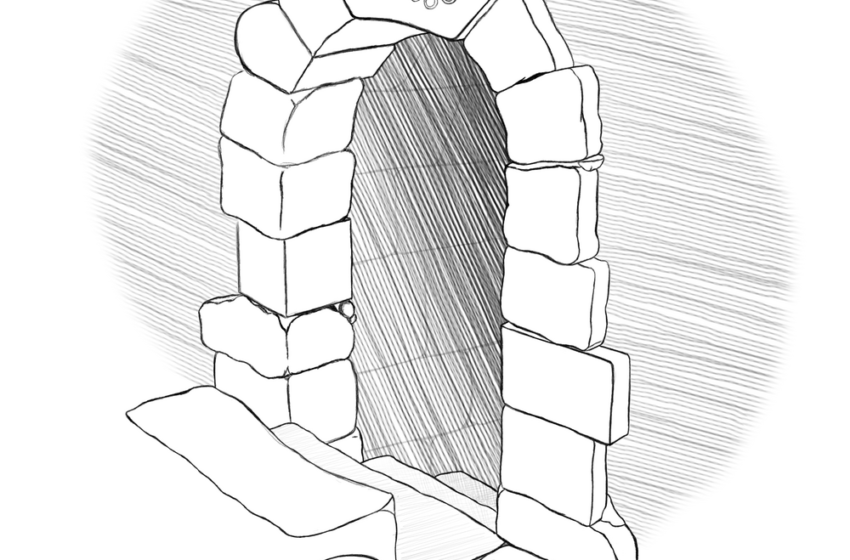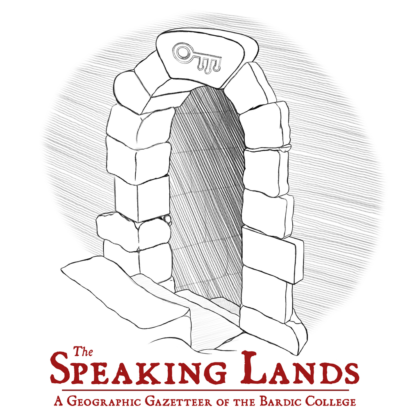(I hit that “Publish” button a little too soon!)
This week’s entry is TROLLS, which I have actually tried to stick to their Scandinavian origins more than the brutish lunkheads you often see in other fantasy. They’re shy and retiring, but once held vast dominion over much of the Speaking Lands, and many consider them the original classical civilization. Now they just want to travel and enjoy a simple life at home. You know, like Norwegians.
—
TROLLS
A people long past its prime, the troll’s civilization once dominated all of northern Ipeiros and has littered its landscape with the ruins of its empires. Today, modern troll settlement is concentrated in the northwestern hinterlands, far from other settlements. A sighting of a troll is often an event for other peoples, as they are as striking as they are rare. Possessed of tall, broad builds festooned with mats of body hair, trolls are the largest of the speaking peoples. Despite their monstrous frames, their rounded facial features are surprisingly gentle and expressive—just often hidden under billowing tufts of hair.
Trolls possess a vast body of oral tradition known as trollsong, which stretches almost as far back as cuca historical mosaics. Much of this body of knowledge has been disseminated among other speaking peoples, though not all. Older trollish histories are of little interest or use to other peoples, and their culinary songs are not particularly appreciated outside of very select circles. Some trollsongs are considered confidential to varying degrees, and troll canters may be hesitant to share them with outsiders. Given the general trollish disregard for restrictions, however, there are few trollsongs that have not leaked to the Bardic College.
According to trollsong, the first trollish kingdom arose on the banks of Ellamthorn Lake, although after a pyrrhic battle with “the great menace” in the lake, the trolls migrated west into Toriel. For the next eight centuries, their kingdoms and empires flourished, spreading trollish culture and dominion to the Rushing Sea and into the western foothills of Loratha. The empire of Tor El, in particular, was founded at least four different times, each successive empire claiming its predecessor’s authority. The historical record’s first mention of Tour Toriel occurs during this time, as well as the founding of Ouradon.
In a world of primitive scarcity, the troll empires were a beacon of stability and prosperity, but they were also viscious, authoritarian states where the general populace lived and died for the benefit of scheming elites. While the highest echelons of society were reserved for those of trollish blood, the machinery of their empire required a burgeoning middle class to constantly expand its power. These middle class operatives were originally trolls, then gnolls and other trollish half-breeds, but inexorably expanded to a cosmopolitain culture that accepted anyone willing to do the elites’ dirty work. The northwest grew increasingly cosmopolitain as people immigrated into trollish lands, hoping to win their way into prosperity.
The collapse of the trollish empires happened very suddenly, and is one of the few lacunae in trollsong histories. Scholars propose many causes, including the climactic shift brought on by the Asfixis explosion, the introduction of foreign peoples from Kharzan and Loratha, and the hunting to extinction of the golun, a key power source for trollish wizardries. More popular renditions of the collapse blame the Curse of Julianna. Academia being what is is, some scholars propose that the fabled curse manifested as those climate, demographic, and environmental shifts. It took little more than a generation for the grand empires of the trolls to collapse into petty, squabbling kingdoms dreaming of their grandparents’ glories.
As trollish power collapsed, it was largely replaced by successor states ruled by the descedants of the imperial middle class. Trolls were displaced into progressively remote fortresses and territories. Some of this displacement was by force, but trollsong strongly suggests that much of this retreat was voluntary; a common refrain is that the trolls “lost their taste” for conquest and dominion. Over the centuries, many of these trollish enclaves disappeared, their populations moving to other, more distant communities or being replaced by influxes of other peoples. Some whisper that troll towns are literally disappearing into the mists of the Wildermarch, and a number of such towns can no longer be found, not even in ruins.
What few troll communities still exist lie on the outskirts of civilization and are quiet settlements mostly focused on agriculture and fishing. In the Norsteppes, a number of trollish clans still roam, most of whom founded the tribes and nations of which they are now little more than minor members. Trolls are respected for their deep understanding of history and geography, even sought out for their knowledge, but are hardly even considered as political or military threats.
If trollish culture has one feature endemic to all its members, it is an appreciation for entropy and collapse. Trolls enjoy watching something fall apart, whether that is a political alliance, a defensive line of infantry, or a nation, and are rarely above supplying the gentle nudge in exactly the wrong place that will bring it all toppling down. Most other peoples believe that this is simply shaudenfraude: having lost their people’s hegemony, trolls delight in others meeting the same fate, in both large and small ways.
The rest of trollish culture is largely fragmentary, and trolls themselves are prone to adopting the local mores of their neighbors. They are largely monogamous and have little use for gender roles or expectations. The trollish tongue famously does not have gendered pronouns at all. Their marriages typically occur later in life and rarely produce more than two children, upon whom they heap their attentions and affections. Once reaching majority, trolls inherit the bulk of their family wealth while their parents retire, an oddity among the speaking peoples. Trollish elders spend their last years singing, fishing, and tending small subsistence farms before passing away. Historically, trolls disposed of their dead through exposure to the elements on burial platforms. This practice persists in the Norsteppes and in their enclaves in Toriel and Wildermarch; otherwise they typically bury their dead according to the vine witch or sylvan rites of their neighbors.
Trollish young adults often commemorate their inheritance with travel, and some wander very far from home. A few turn this stage of their life into a career as adventurers, while others try their hand at even more exotic professions in distant locales, like studying at the Arcane Mysterium in Mergather Gulf or taming hippopotami for ngubu-masuwa in the depths of Verdas. Others stay closer to home, visiting old trollish ruins and seeking to understand the height and fall of their people. Almost all plan to return home, find a mate and settle down to childrearing, so that they can hand off their wealth and enjoy their retirement.
—
Let’s do a theme poll: all regions. Where shall we go next week?

